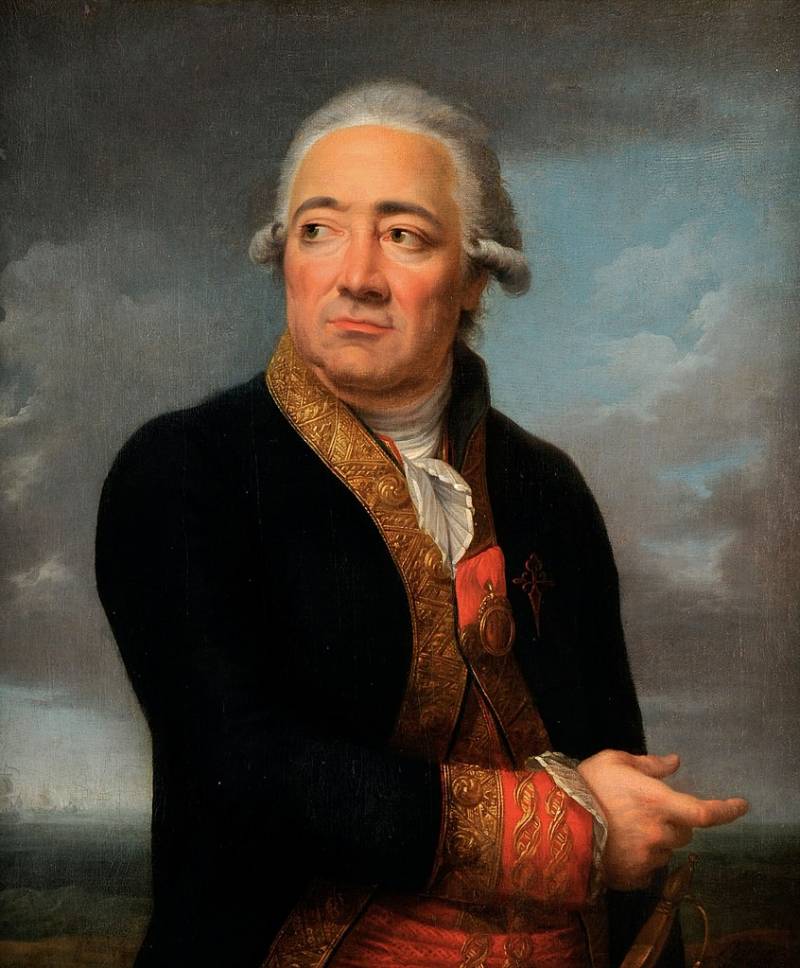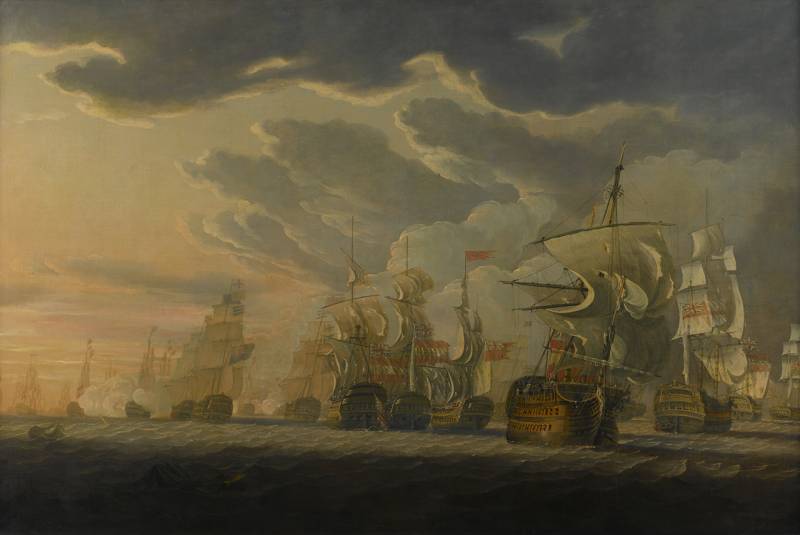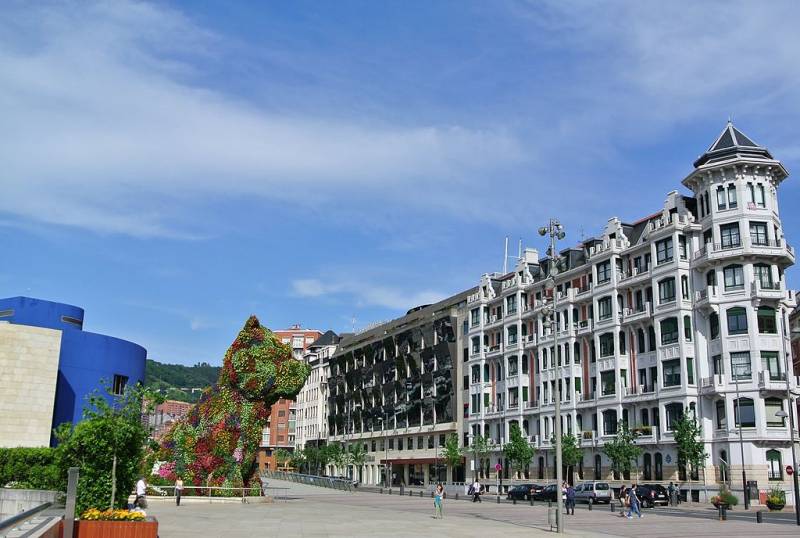Jose de Masarredo and Salazar, military theorist and victim of politics
Another Basque in the Royal Navy
Jose de Masarredo Salazar Munyatones and Gortazar was born in 1745 in a family of hereditary sailors. His father was Antonio Jose, lieutenant of Armada, rechidor and Alcald Bilbao, who died when the young Jose was only 8 years old, and his mother was Maria Josefa de Gortazar and Perez de Arandia. Of course, he did not interrupt the family tradition and went to serve in the Navy. In the 1759 year, at the age of fourteen, he was already listed as a midshipman in Cadiz, and his first duty station was the sloop "Andalus" under the captain of the frigate (capitan de fragata) Francisco de Vera. On the night of April 13 of 1761, Masarredo first declared himself as a brave, stubborn, cold-blooded and skillful sailor - in a storm, when the sloop turned out to be at sea and did not see the land, he, anticipating the evil, contrary to the opinion of other officers on the boat, went to intelligence and found that the Andalus was about to sit on the rocks. He risked himself, since a small boat could easily be turned over in a storm, and he would then drown, but as a result, the midshipman managed to save the lives of three hundred people who were on board the ship at that moment. After that, the authorities noticed a young and capable Basque, and he began to gradually move up the career ladder. In 1772, he went on a scientific expedition with Juan de Langara to the Philippines, and in the coming years became his constant companion and friend. However, fate soon divided friends, returning him to Spain, and sending him to serve in the Mediterranean Sea. Having walked the path of a peaceful scientist and researcher, Masarredo soon enters the path of war.
In 1775, he happened to participate in an expedition to Algeria, which boiled down to a landing in the region of Oran and an attempt to capture him. Masarredo was responsible for organizing and landing and the necessary navigation calculations, and they were performed exemplary. And although the expedition itself ended in failure, the officer’s skillful actions were noticed by the authorities, and he was promoted, but with a temporary transfer to land. There, José de Masarredo develops a vigorous scientific activity, improving his education, and at the same time working as a teacher and researcher. At this time, he was already publishing several of his own works on navigating and maneuvering ships, getting acquainted with the works of Jorge Juan, and studying the basics of cartography.
The latter came in handy when, in 1778, he became commander of the battleship San Juan Batista and carried out a large-scale volume of hydrographic work, mapping the coast and bottom depths near the Iberian Peninsula. When the Sea Atlas collection of maps is due to be published soon in Spain, many of its maps will be compiled by Masarreda. At the beginning of 1779, he receives the title of Major General, and publishes his old work, which was waiting for its time - "Fundamentals of naval tactics." In it, Masarredo for the first time tries to revise the standard tactical methods of battle at sea, seeks to invent something new instead of the old battered line of battle, to derive a certain formula of victory that would allow to prevail over any enemy, including the British. The work turned out to be good, but obviously incomplete, which the author himself felt. The main discoveries were yet to come ....
Rapid take-off ....
When Spain entered the war with the British in 1779, Masarredo became chief of staff of Admiral Luis de Cordoba and Cordoba, becoming virtually the second man after him in Armada. In addition to the usual troubles for such a position, he had to fulfill another important function - to push his boss, prompting him to take active actions, for Cordoba was already 73 years old at the time the war started, and senile passivity and caution already possessed his mind. It was at this time that he met Antonio Escagno, who quickly became his friend and assistant, providing all kinds of help in the theoretical research of Masarreda. Strongly dissatisfied with the activities of the Other Armada, Jose, at the same time, sees serious shortcomings in the poorly established interaction between fleets. Therefore, already in 1779, he creates tabular “Instructions for Signals”, which greatly simplify and unify the signal system of the allies, which makes it possible to issue orders and execute them much faster and more accurately. In 1780, Masarredo became the author of a risky, but entirely justified plan to capture the British convoy from Cape Santa Maria, as a result of which the Spanish-French fleet received rich trophies, including 5 East Indian ships, which were soon incorporated into the fleet as frigates.
And soon after that he had to come into conflict with the French allies. It was planned to send a large convoy across the Atlantic - 130 “merchants” under the protection of 66 battleships and 24 frigates, but the barometer testimony indicated that a strong storm could soon happen. The French sought to go further, ignoring the warning, the Count d'Estaing, with whom Masarredo had a quarrel, became a particularly active supporter of continuing the campaign. Nevertheless, they managed to convince the Allies to go to Cadiz for at least a few days. And it turned out that Masarredo, furiously demanding entry into the port, was right - a strong storm broke out, which could send more than one ship from the Allied fleet to the bottom. Alas, not everything succeeded him - so, in the 1782 year, he could not enough explain his superior, Admiral de Cordoba and Cordoba, so that he could take active action, as a result of which the English convoy was first allowed into besieged Gibraltar, and then the battle at Cape Espartel, characterized by an extreme degree of indecision with sufficiently active maneuvering.
With the end of the war, Masarredo was appointed to command his naval squadron, which finally consolidated the experience gained and verified some theoretical developments, which led in the 1789 to the beginning of the writing, in collaboration with Antonio Escagno, “Decisions” - a detailed description of the basics of naval tactics and combat maneuvering. To do this, they even had to temporarily leave the current fleet, taking up other matters. This work was a clear illustration of the scale of the Masarredo figure, a proof of the outstanding naval skills that he possessed. Abandoning the old battle tactics in the strict lines of the battle, he advocated decisive, proactive actions, the concentration of attacks in the center of the enemy system, and active maneuvering. He was not afraid of either rapprochement or a stronger opponent, believing that the one who breaks the enemy system and forces him to play by his own rules will prevail in battle. In this, he was similar to the most prominent naval commanders of his time, in decisiveness and lack of dogmatism, standing on a par with Ushakov and Nelson. The tactics he proposed turned out to be painfully similar to what Nelson did under Trafalgar in the 1805 year, delivering a concentrated blow to the middle of the already downed Allied system. In a similar blow to the center, Masarredo saw an opportunity to defeat any enemy, even yielding to him as a training crew. The writing of the work took some more time, and in the 1793 year the “Decisions” were published in Madrid. The Armada met them with satisfaction and enthusiasm, and the king awarded the officially recognized naval theorist with the status of a knight of the Order of Santiago.
In 1795, Masarred was appointed to command the squadron, which was supposed to go to the aid of the Langara squadron in the Mediterranean Sea. After returning after a long absence to the active fleet, he found him in a terrible state - salaries are paid irregularly, ships are in poor condition, crews are worse prepared than before. Masarredo was not one of those people who would calmly endure a similar situation, as a result of which he entered into an acute conflict with politicians and courtiers. He was not alone - the support to the military theorist was also provided by former naval minister Antonio Valdez and Fernandez Bazan, who were dismissed due to his disagreement with the party’s general course. As a result of this, instead of commanding a combat squadron, Masarredo was decommissioned ashore and assigned to work in Ferrol, albeit with all honor and respect. As a result of this, as well as other court intrigues, it was not him who was appointed to command the fleet, but José de Córdoba and Ramos, who was passive and deprived of naval talent. He did not possess organizational and tactical talents, as a result of which he did not even establish more or less tolerable intelligence.
The result of this political squabble was the battle at Cape San Vicente (Saint Vincent) in the 1797 year, when Armada, having almost twice the superiority in strength, lost the battle to the British, losing to them 4 battleships as trophies, and almost losing the fifth, " Santisimu Trinidad. " A scandal erupted, Cordoba was tried and expelled from Armada. The new fleet commander gathered to appoint the old Admiral Borkh, who was no better than Cordoba, but the nerves of the officers could not stand it. Having gathered a delegation with the support of Federico Gravina, they, contrary to the charter, achieved an audience with Queen Maria Louise, who actually ruled the country, and convinced her that only one person in Spain could effectively command the fleet - Jose de Masarredo and Salazar. As a result, he was immediately returned from opal, put into operation, and sent to Andalusia with the simple task of doing everything in his power, since the ships of Armada were scattered at different ports, and Cadiz at that time was already blocked by the British fleet, and there was a serious threat of seizure of the city.
... and a quick fall
The best admiral of Spain, having received under his command the best junior flagship (Gravina), immediately took up his duties and developed vigorous activity in the city. Very quickly, the ships that were here were put in order, in La Carraque they set up the fast construction of light rowing ships, and the coastal defense was put on alert. The English fleet carried out 3 and 5 July night attacks of the city, but was repelled with losses; Spanish ships regularly made sorties into the sea, preventing the blockade from completely shutting down, which is why merchant ships continued to break into Cadiz. The following year, Masarredo, trying to defeat the enemy in parts, went to sea with 22 ships, and began to cruise south of the coast of the Iberian Peninsula, frightening off a patrol from 9 British battleships. This squadron had real chances to run into a battle with the Spaniards and lose it, but then a storm broke out, and the British managed to escape from the attack.
After staying at sea for some time, Masarredo returned to Cadiz, and in time - less than a day later, the fleet of Admiral Jervis appeared in the city, consisting of 42 ships. If the Spaniards didn’t have time to return home, they would have been waiting for the battle, which, most likely, Armada would have lost. Despite the absence of military clashes, the result of these actions was clear - the blockade of Cadiz is not reliable, and the crisis period has passed. Since the Spaniards themselves were no longer able to defeat the British, Masarredo went to Paris in 1798 in order to agree on cooperation with the French. Alas, the combination of straightforward and tough Masarred’s candidacy with the realities of the time turned out to be disgusting - he negotiated with difficulty, and after the coup of 1799, when Napoleon came to power, things went very badly. It was also said that Masarredo became one of those who did not support the dubious and adventurous expedition to Egypt, and blocked the participation of Spanish ships in it. Napoleon did not like the obstinate and high-handed Spaniard, and he, acting by various methods, first achieved the deprivation of that command over the fleet, and then his withdrawal from Paris in the 1801 year. From that moment, Masarreda’s career rapidly collapsed.
Upon his return to Spain, he was appointed general captain of the Cadiz department, which was theoretically not bad, but at the same time deprived Masarred, who was categorically dissatisfied with the current situation in the country in general and in the navy, in particular, influence on the fate of Armada. However, he did not stay here for long - in 1802 he was returned to the fleet, having been appointed chief .... The naval barracks of Bilbao. This was perceived by him as a spit in the face, and, together with the growing crisis of Armada, forced the naval commander to act - to correspond with officers, send petitions to Madrid, trying to achieve any improvement, let him not for him, but for the fleet. All this caused only irritation at court, as a result of which, in 1804, Masarredo lost even that small position that he held, and went into exile first to Santonia and then to Pamplona. The official reason for the link was the accusation of trying to contrast local interests with the interests of the state, which, of course, was not true, because the interests of the fleet always coincided with the interests of the state.
Many hoped that in the 1805 year Masarredo would return from exile, he would be put back in command of the Armada in order to save her from the situation in which the French had driven her in general, and Villeneuve in particular, but Madrid was implacable - the disgraced admiral had to stay there , where before, that is, as far as possible from the existing fleet. Broken down by such a treacherous attitude on the part of the king, enraged by the news of the defeat at Trafalgar and the death of many prominent officers, disappointed in the Bourbons, in 1808 he probably committed his only truly negative, but understandable act, swearing allegiance to Jose I Bonaparte , and received from him the post of Director General of Armada. However, he was not destined to stay in this position for a long time - in 1812, he died in Madrid. The Spaniards forgave their great admiral for such a betrayal, especially after a time when the whole rot of the governments of Carlos IV and Fernando VII became clear, but they still prefer to remember him not as often as those who remained faithful to the end. One street in Bilbao is now named in honor of Masarredo, but that’s essentially what it ends with - no monuments, no squares, nothing ....
Jose de Masarredo and Salazar is considered the best Spanish admiral of the XVIII century, and one of the best throughout the history of Spain. In terms of the scale of his personality, ideas, initiative, tactical literacy and organizational abilities, he was perhaps the only allied admiral who was able to fight Nelson on equal terms. And at the same time, the history of the service of Masarreda is a clear illustration of the whole history of Spain at the end of the 18th - beginning of the 19th centuries: recognized in the Navy and abroad, he never received a full independent command due to political intrigues, fell into disgrace, and as a result was excluded from any work of Armada when she most of all needed him.
Even more, it is a clear illustration of the situation in which the enlightened, talented part of Spanish society in the 1808 year was forced to choose between its people, who supported insignificant rulers against the invaders, and foreigners, guided by pragmatism and the best motives, capable of reforming an increasingly lagging Spain That is why, being the great admiral, Masarredo did not leave a big trace in world history, and is now practically unknown outside the borders of his native Fatherland - for all this is not the result of his personal qualities, but the decline of the whole state, because of which this great husband could not prove himself to the same extent as other great admirals.
To be continued ....



Information